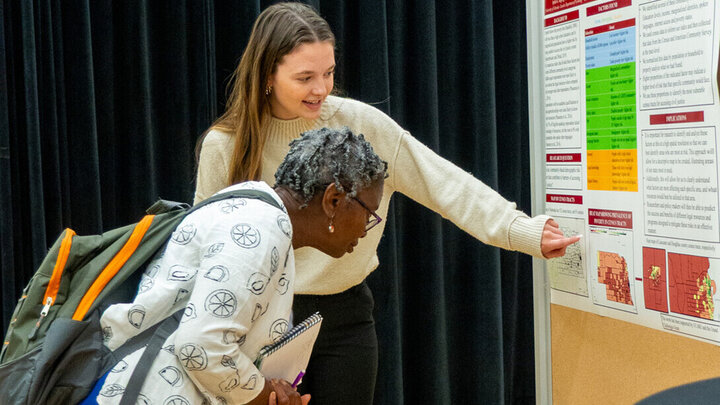More than 300 students participated in presentation sessions during Student Research Days, with 127 graduate students and 183 undergraduate students presenting.
The 2025 Student Research Days Poster Sessions and Creative Exhibitions were held April 15-16.
Graduate student awards
- Peace Adegbite (Nigeria; studying physics and astronomy) “Anomalous Surface Behavior in Temperature-Dependent LEED Study of Sr3Ir2O7”, adviser: Peter Dowben
- Sadia Sharmeen (Bangladesh; studying Chemistry), “Characterization of binding by pharmaceuticals as environmental contaminants to polystyrene nanoplastics using high-performance affinity chromatography” advisor: David Hage
- Andrea Wagh (Houston, Texas; studying history) “Preserving Hidden Histories: Jewish Children in Occupied France, 1939 – 1945”, adviser: Bedross Der Matossian
Undergraduate college awards
- Aaron Morrissey (Omaha; studying data science and economics), “Uncovering the Money Behind Defense Tech: What Drives Contract Spending on Military Base Innovations?” adviser: Mitch Herian
- Jagger Spiering (Norfolk; studying biochemistry), “Expression and Purification of HPPD in the Tyrosine Breakdown Pathway of Blood-Feeding Arthropods,” adviser: Limei Zhang
- Elizabeth Andersen (Lincoln; studying microbiology and biochemistry), “Creating an in vitro model to evaluate potential anti-adipogenic activity of Gordonibacter and Lactobacillus species,” adviser: Amanda Ramer-Tait
- Mason Hardin (Sioux City, Iowa; studying chemistry), “Expression and Purification of HPPD in the Tyrosine Breakdown Pathway of Blood-Feeding Arthropods,” adviser: Georgina Bingham
- Andy Knopik (Lincoln; studying psychology and women & gender studies), “Harnessing Habeas Corpus: Women's Struggles Against Coercive Psychiatric Institutionalization,” adviser: Katrina Jagodinsky
- Nicole Kallio (Elkhorn; studying psychology and microbiology), “Second chances or setbacks: Factors predicting recidivism following re-entry programming,” adviser: David Dilillo
Undergraduate honors awards in various categories
- Best Communication, recognizes an Honors student researcher who displayed the best communication skills in sharing their research: Abhinav Bettadapura (Omaha; studying mathematics and biochemistry) “Investigating ANKLE-2 Splicing: Evidence of a Transmembrane-Lacking Isoform Across Cell Lines,” advisor: Lindsey Crawford
- Long-Term Contributions to the Field, recognizes an Honors student researcher whose work displayed the most potential for significant long-term contributions to the discipline of study: Amara Bryant (Omaha; studying biological sciences), “Immunosenescence and HCMV: the Interaction Between UL2 and the Human Gene HMGCS1,” adviser: Matthew Wiebe
- Immediate Contribution, recognizes an Honors student researcher whose work displays the most significant and immediate potential for real-world impact: Laura Kirshenbaum (Omaha; studying biochemistry and microbiology) “Expanding the Dynamic Range of Methanosarcina acetivorans through Recombinant Expression of the T7 Promoter System,” adviser: Nicole Buan
- Overall Excellence, recognizes an Honors student researcher whose work demonstrated outstanding achievement across all aspects of research and presentation, from originality and clarity to impact in sharing their work: Alaa Ismail (Lincoln; studying global studies (and computer science via CoE)), “Access to Civil Justice: A Data-Driven Approach to Integrating Legal Resource Discovery with Interactive Geospatial Visualization,” adviser: Dr. Leen-Kiat Soh
Graduate students who were awarded competitive prizes for their scholarship and presentation skills received $400 toward travel grants to present their research regionally or nationally as well as support other research costs. Undergraduates were awarded prizes valued at $250 sponsored by their academic colleges. Additionally, five undergraduate students were recognized by the University Honors Program for their research.
Hundreds of faculty, postdoc, staff and graduate student volunteer judges met with students during morning and afternoon sessions and evaluated their presentations.




